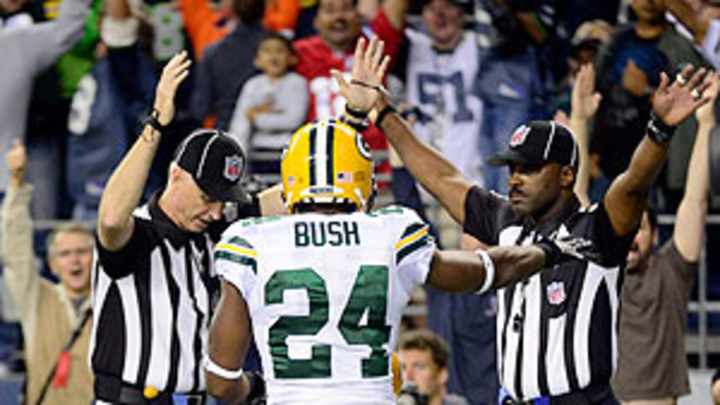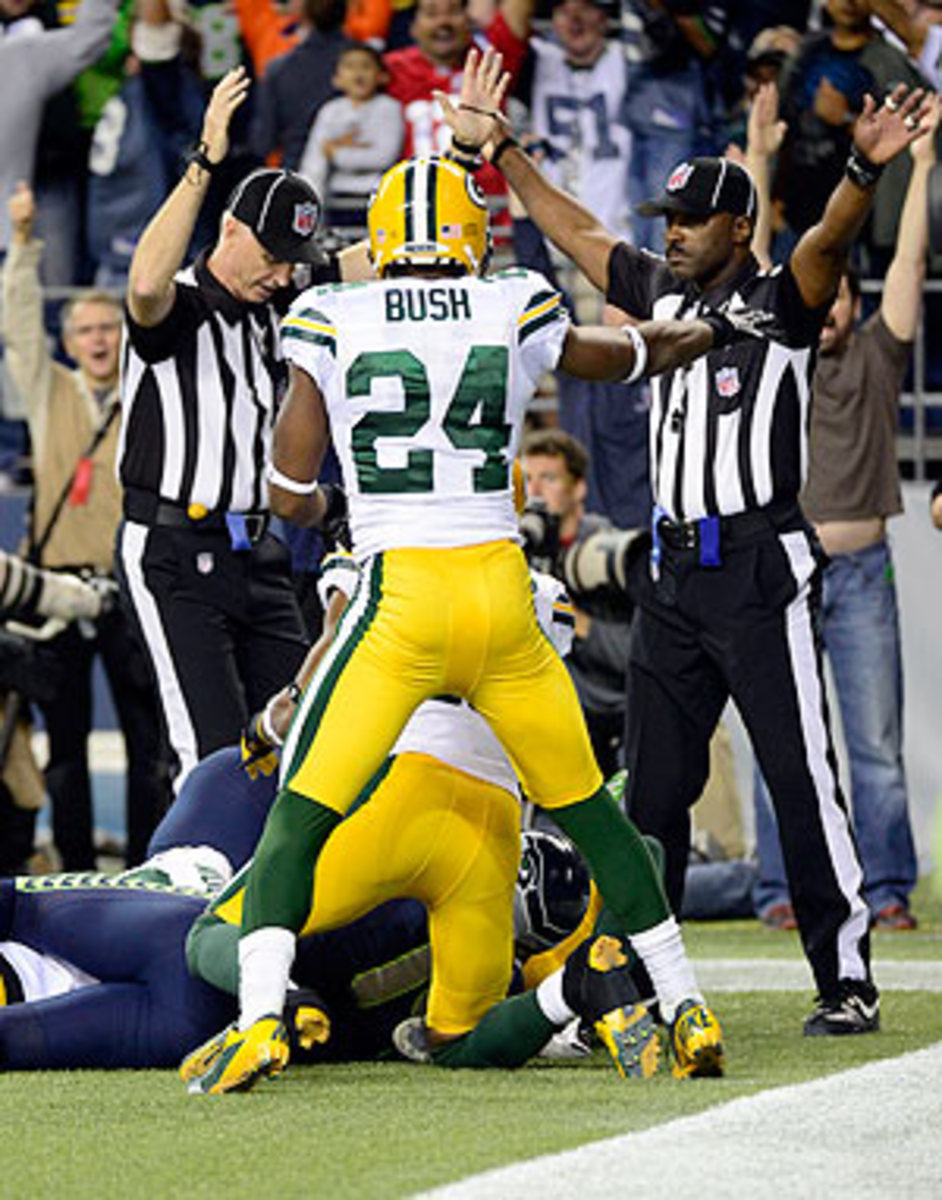Replacement refs botch Packers-Seahawks ending

One referee ruled an interception by Packers safety M.D. Jennings. Another ruled it a touchdown by Golden Tate. (CSM /LANDOV)

Who knows what was going through Roger Goodell's head on Monday night as he fiddled while the integrity of his league burned to the ground. There can be no more denying the undeniable: The presence of replacement officials has significantly impacted the NFL's product on the field.
Until this debacle between the Packers and Seahawks, the replacement officials were a nuisance, a punch line. They had not, aside from some randomly incorrect calls here and there, directly impacted a game's outcome.
And then Monday's final play happened.
With the Seahawks down five and the clock ticking to zero, Russell Wilson scrambled around and heaved one to the end zone. Golden Tate, who earlier had two potential TD passes slip out of his hands, shoved a defender to the ground and then leaped into the air. Green Bay's M.D. Jennings beat him to the punch, plucking Wilson's pass from the pile and tumbling to the ground.
Tate, in an act of desperation, reached around Jennings to put his hands on the ball too.
To just about everyone watching, including one of the officials on the field, it was a clear interception. But the call? Touchdown. Seattle wins.
"I had a feeling it was going to be a touchdown," Wilson told ESPN after the game ended. "We came too far for it not to be a touchdown."
Destiny is one thing. This was highway robbery.
The play was reviewed -- normally, the ruling that Tate and Jennings had simultaneously possessed the football, resulting in a catch is not reviewable; however, the circumstances are different in the end zone, which the NFL confirmed in a statement Monday afternoon:
"In the end zone, a ruling of a simultaneous catch is reviewable. That is not the case in the field of play, only in the end zone. Referee Wayne Elliott determined that no indisputable visual evidence existed to overturn the call on the field, and as a result, the on-field ruling of touchdown stood."
And here's how the NFL explains simultaneous possession in its rule book:
"If a pass is caught simultaneously by two eligible opponents, and both players retain it, the ball belongs to the passers," the rule states. "It is not a simultaneous catch if a player gains control first and an opponent subsequently gains joint control."
So, the Seahawks took the win. Only not before a hectic, unbelievable few moments in which the Packers left the field, Seahawks coach Pete Carroll started doing interviews, and the officials huddled to determine that the game could not end without Seattle attempting an extra point.
Eventually, the Seahawks did so, adding a meaningless point for a 14-12 victory.
But even if that's how the game will look in the record books, there's no way to sweep under the rug the complete sham that led us there.
"This is wrong," a clearly agitated Jon Gruden said on ESPN's broadcast as he, Mike Tirico and Austin railed against the late-game officiating. "I don't feel good about this."
Who does? Maybe the Seahawks, who moved to 2-1 -- heck, I'm sure the 1972 Russian basketball team celebrated in style after its eternally controversial win over the United States.
Monday's game was not rigged. The officials did not purposely make it so Seattle walked off with a victory in front of its raucous home crowd. They simply blew the biggest call of the NFL weekend, on a Monday night in front of a massive TV audience.
"I didn't see it, just saw the reaction like most people, obviously the communication was that (the Packers) had the ball," Green Bay head coach Mike McCarthy said. "I still haven't seen the replay of the play. I was told MD Jennings intercepted the ball.
"I've never seen anything like that in all my years of football."
"It seemed like at first, from my vantage point, the referee in the back, I saw him waving his arms over his head which means he was calling touchback," Aaron Rodgers said. "No idea how the other guy said touchdown to Golden Tate on the replay. He obviously takes his arm off whatever part of the ball he may or may not have had."
Rodgers wasn't the only Packer player to comment.
"It's the old cliche, when there's smoke there's fire," B.J. Raji said "... Right now it's a tough pill to swallow, but we'll get over it."
"I can't get fined if I'm saying that the refs did a great job ... so they did a great job," Greg Jennings added, sarcastically. Other Packers players, most notably T.J. Yang, lashed out with expletive-filled rants on Twitter.
Seattle did nothing wrong here, mind you. In fact, the Seahawks turned in an inspired effort for much of the night, totally derailing Green Bay's offense in the first half en route to a 7-0 halftime lead, then getting a clutch stop late to set up the Wilson-to-Tate dramatics.
Under normal circumstances, a Seahawks win on Monday night would have left us talking about their resurgent defense, Wilson rallying late after going nearly two quarters without a completion, or the amazing Seattle home crowd.
Unfortunately, the NFL's standoff with its normal officials has made the preseason and the first three weeks of the season anything but normal.
Rodgers, too, could have walked out of Monday night's game as a hero. His offense flipped the script in the third quarter, committing the run game after struggling through the air early. Using that approach, the Packers scored on three straight possessions and completely dominated from halftime until late in the fourth quarter -- at one point, Green Bay had run 40 second-half plays to Seattle's six, with the 40th being a TD run from Cedric Benson to put the Packers ahead, 12-7.
Seattle tried to respond, aided by a roughing-the-passer penalty and egregious pass interference call (one that came just moments after a similarly questionable call went against the Seahawks to keep Green Bay's TD drive alive).
In the end, it looked like Seattle would come up just short. With time for just one last play and 24 yards shy of the end zone, the Seahawks needed a miracle.
They got it -- thanks to a miraculously bad call.
And now, even though TV ratings continue to soar through the roof and fans keep packing NFL stadiums coast to coast, the league and commissioner Roger Goodell must answer for their mistakes.
The replacement officials are doing the best jobs they can, but they are in way, way over their heads. That much was apparent to most of us even before Monday's catastrophe.
